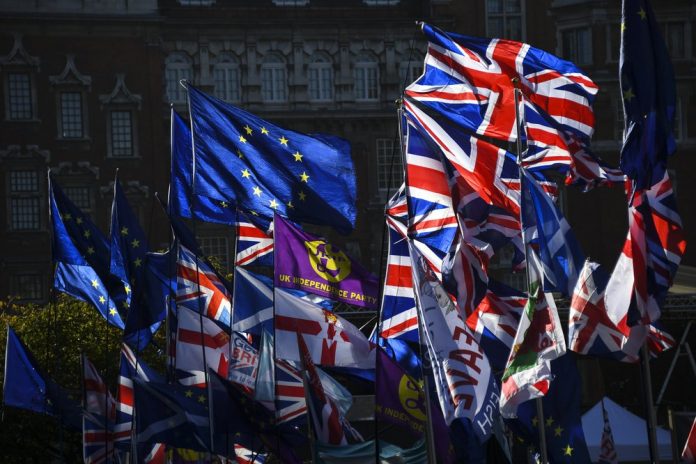by Jill Lawless and Samuel Petrequin, AP
LONDON (AP) — The European Union agreed Monday to delay Brexit by three months until Jan. 31, acting to avert a chaotic U.K. departure just three days before Britain was due to become the first country ever to leave the 28-nation bloc.
The decision was welcomed by politicians in the U.K. and the EU as a temporary respite from Brexit anxiety — but not by British Prime Minister Boris Johnson, who said just weeks ago that he would “rather be dead in a ditch” than postpone the U.K.’s leaving date past Oct. 31.
In the end, the choice was not in his hands. The U.K. Parliament forced Johnson to ask for a delay in order to avoid a no-deal Brexit, which would hurt the economies of both Britain and the EU.
Johnson is now pushing for an early election as a way of breaking the political impasse. He hopes voters will give his Conservative Party a majority, allowing Johnson to push through the divorce deal he struck with the EU and — finally — take Britain out of the bloc.
Lawmakers in the House of Commons were voting later Monday on a government motion calling for a general election on Dec. 12.
Earlier in the day, after a short meeting of diplomats in Brussels, European Council President Donald Tusk tweeted that the EU’s 27 other countries would accept “the UK’s request for a Brexit flextension until 31 January, 2020.” Under the terms of the “flextension,” the U.K. can leave before Jan. 31 if the British and European parliaments both ratify a Brexit divorce agreement — either on Dec. 1 or Jan 1.
“It was a very short and efficient and constructive meeting and I am happy the decision has been taken,” said Michel Barnier, the EU’s chief Brexit negotiator.
There was no immediate response from Johnson, who is bound by law to accept the EU’s terms. But Johnson’s spokesman insisted it was Parliament’s fault, not the prime minister’s, that Johnson had failed to deliver his core promise of an Oct. 31 Brexit.
“We should be leaving on Oct. 31,” said Johnson spokesman James Slack. “He did secure a great new deal, he set out a timetable that would have allowed the U.K. to leave on Oct. 31 with that deal — and Parliament blocked it.”
The delay is the third time the Brexit deadline has been changed since British voters decided in a 2016 referendum to leave the bloc.
Johnson took office in July vowing to “get Brexit done” after his predecessor, Theresa May, resigned in defeat. Parliament had rejected her divorce deal with the bloc three times, and the EU had delayed Britain’s scheduled March 29 departure, first to April, and then to October.
Johnson has faced similar political gridlock, as Parliament blocked his attempt to push through his Brexit deal before the October deadline and made him ask the EU for more time.
The prime minister now wants to shepherd his Brexit withdrawal bill through Parliament before the election, but Johnson’s opponents don’t want to give him that victory. His motion Monday calling for a Dec. 12 vote — more than two years before Britain’s next scheduled election in 2022 — needs the support of two-thirds of lawmakers to pass, and opposition parties are reluctant to hold an election on Johnson’s terms.
Two opposition parties — the Liberal Democrats and Scottish National Party — are backing a rival plan for a Dec. 9 election if Johnson’s proposal fails. Johnson’s government has signaled that it will accept that idea if its own motion is defeated.
Even if there is an early election, it could produce a Parliament as divided over Brexit as the current one. All the political parties in Britain are worried about a backlash from grumpy voters asked to go to the polls at the darkest, coldest time of the year. Britain has not had a December election in almost a century.
European officials, meanwhile, urged Britain not to waste the extra Brexit time.
German government spokesman Steffen Seibert welcomed the Brexit delay, but cautioned Britain to “use the additional time productively.”
Guy Verhofstadt, head of the European Parliament’s Brexit group, wrote on Twitter that “whether the UK’s democratic choice is revoke or an orderly withdraw, confirmed or not in a second referendum, the uncertainty of Brexit has gone on for far too long. This extra time must deliver a way forward.”
France was initially reluctant to extend the Brexit deadline beyond Oct. 31, but European Affairs Minister Amelie de Montchalin said the prospect of a new election in Britain justified the new delay. Montchalin also said it was not too late for Britain to revoke Article 50 of the EU treaty and cancel Brexit — something that Johnson has vowed he will never do.
“The prime minister can pick up his phone and call Brussels to say: I stop everything,” she said.
___
Petrequin reported from Brussels. Lorne Cook in Brussels and Gregory Katz in London contributed to this report.




